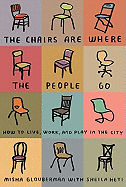 In a new twist to what has been a standoff regarding $269 million in sales taxes that Texas claims it is owed (Shelf Awareness, February 11, 2011), state officials and Amazon are discussing a proposal "that would see the online retail giant promise to bring more than 5,000 jobs and $300 million in the state over the next three years. In exchange, lawmakers would have to grant Amazon a 4½-year exemption from collecting tax on online sales in Texas," according to the Austin American-Statesman.
In a new twist to what has been a standoff regarding $269 million in sales taxes that Texas claims it is owed (Shelf Awareness, February 11, 2011), state officials and Amazon are discussing a proposal "that would see the online retail giant promise to bring more than 5,000 jobs and $300 million in the state over the next three years. In exchange, lawmakers would have to grant Amazon a 4½-year exemption from collecting tax on online sales in Texas," according to the Austin American-Statesman.
Mark Miner, a spokesman for Governor Rick Perry, said the governor "is always working to create jobs in Texas, and he supports any kind of legislation that would accomplish that goal. His focus has always been on the Texas economy and creating jobs in this state. He's always talking to companies in Texas that want to expand, or companies outside of Texas who might want to locate here."
Paul Misener, Amazon's v-p of global public policy, said the company would "support legislation, similar to law enacted elsewhere, that would allow us to bring Texas new jobs and investment."
But Ronnie Volkening, president and CEO of the Texas Retailers Association, called the proposal "a Hail Mary attempt" by Amazon and said his group "certainly opposes this eleventh-hour proposal, and we hope and believe the Texas Legislature will continue to stand with Texas main street retailers."
The Lone Star Report noted that "it appears this proposal is exactly that--a proposal. When LSR asked Rep. John Otto (R-Dayton) about the status of negotiations over the sales tax nexus provision on SB 1, he replied that no one was negotiating with him."
News of the proposal also brought a quick response from the Alliance for Main Street Fairness. "Attempts by Amazon.com to get special treatment from Texas lawmakers should have every business owner and taxpayer outraged," said spokesman Eric Bearse. "Main Street businesses are calling on elected officials to stand with Texas employees and employers over a company whose entire business model is based on tax evasion. Texans will not stand by and let the government give preferential treatment to one out-of-state company that gives it an advantage over existing Texas businesses."
---
 Last week, online booksellers using the Fulfillment by Amazon service discovered they must now ship all FBA inventory to the company's warehouse in Breiningsville, Pa. AuctionBytes reported that this development "is bad news for West Coast and Midwest sellers, since they'll pay more in shipping costs and it will take longer for their inventory to arrive at Amazon's distribution center. The news comes not long after FBA sellers received news of a new weight-based long-term storage fee for items stored over 365 days. A seller said about 6-9 months ago, Amazon had begun requiring Amazon Advantage sellers to ship to the Pennsylvania warehouse too."
Last week, online booksellers using the Fulfillment by Amazon service discovered they must now ship all FBA inventory to the company's warehouse in Breiningsville, Pa. AuctionBytes reported that this development "is bad news for West Coast and Midwest sellers, since they'll pay more in shipping costs and it will take longer for their inventory to arrive at Amazon's distribution center. The news comes not long after FBA sellers received news of a new weight-based long-term storage fee for items stored over 365 days. A seller said about 6-9 months ago, Amazon had begun requiring Amazon Advantage sellers to ship to the Pennsylvania warehouse too."
Although the FBA requirement currently affects new shipments, "booksellers are concerned they could be forced to send inventory already stored in other Amazon warehouses to Pennsylvania," AuctionBytes noted.
---
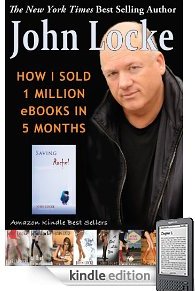 The Kindle Million Club has its first self-published member. Using the Kindle Direct Publishing program, John Locke, author most recently (and appropriately) of How I Sold 1 Million eBooks in 5 Months, became the eighth writer to sell more than a million Kindle books. His novels include Vegas Moon, Wish List, A Girl Like You, Follow the Stone and Don't Poke the Bear!
The Kindle Million Club has its first self-published member. Using the Kindle Direct Publishing program, John Locke, author most recently (and appropriately) of How I Sold 1 Million eBooks in 5 Months, became the eighth writer to sell more than a million Kindle books. His novels include Vegas Moon, Wish List, A Girl Like You, Follow the Stone and Don't Poke the Bear!
---
 The sale of Whitcoulls and Borders stores in New Zealand by bankrupt REDgroup Retail to the James Pascoe Group (Shelf Awareness, May 27, 2011) has been completed. The new owners wound up buying 64 stores, two more than previously announced. (Three earthquake-damaged Whitcoulls in Christchurch and three other Whitcoulls stores were not included in the original deal.) They have retained most employees and plan to rebrand the five Borders stores as Whitcoulls. Pascoe named Ian Draper, a former Pascoe head, managing director of Whitcoulls.
The sale of Whitcoulls and Borders stores in New Zealand by bankrupt REDgroup Retail to the James Pascoe Group (Shelf Awareness, May 27, 2011) has been completed. The new owners wound up buying 64 stores, two more than previously announced. (Three earthquake-damaged Whitcoulls in Christchurch and three other Whitcoulls stores were not included in the original deal.) They have retained most employees and plan to rebrand the five Borders stores as Whitcoulls. Pascoe named Ian Draper, a former Pascoe head, managing director of Whitcoulls.
Pascoe said (via 3news): "The challenge is to make the Whitcoulls business and its product offering relevant and desirable, to refresh the stores, re-motivate, listen to and involve its team members, so as to make Whitcoulls a store that all New Zealanders can feel part of and proud of."
---
Today's Wall Street Journal offers a closer look at Jahm Najafi and Alec Gores, the "veteran investors involved in competing talks" to purchase Borders Group.
 Gores's plan would save approximately 250 retail locations, "which he intends to revamp into more appealing destinations akin to Apple Inc.'s outlets," the Journal wrote. Gores Group "would also emphasize developing a more robust online business for Borders."
Gores's plan would save approximately 250 retail locations, "which he intends to revamp into more appealing destinations akin to Apple Inc.'s outlets," the Journal wrote. Gores Group "would also emphasize developing a more robust online business for Borders."
 While Najafi "has a patient attitude toward the company's digital businesses," he "could bolster his book clubs [Book-of-the-Month Club, the Doubleday Book Club] by tapping the more than 43 million Borders customers who are members of the chain's rewards programs and put outposts in the chain's stores," the Journal noted, adding that he "believes Borders has a strong brand that retains an attractive base of customers Borders can build on by providing them with additional goods and services."
While Najafi "has a patient attitude toward the company's digital businesses," he "could bolster his book clubs [Book-of-the-Month Club, the Doubleday Book Club] by tapping the more than 43 million Borders customers who are members of the chain's rewards programs and put outposts in the chain's stores," the Journal noted, adding that he "believes Borders has a strong brand that retains an attractive base of customers Borders can build on by providing them with additional goods and services."
---
 The British Library reached a deal with Google regarding 250,000 texts dating back to the 18th century, which "will allow readers to view, search and copy the out-of-copyright works at no charge on both the library and Google books websites," BBC News reported, adding that the "works selected to be digitized date from between 1700 and 1870, and the project will take some years to complete, with Google covering the costs of digitizing."
The British Library reached a deal with Google regarding 250,000 texts dating back to the 18th century, which "will allow readers to view, search and copy the out-of-copyright works at no charge on both the library and Google books websites," BBC News reported, adding that the "works selected to be digitized date from between 1700 and 1870, and the project will take some years to complete, with Google covering the costs of digitizing."
Dame Lynne Brindley, the library's chief executive, cited historical precedent for the arrangement, calling it an extension of the institution's 19th-century ambition to provide access to knowledge to everyone: "The way of doing it then was to buy books from the entire world and to make them available in reading rooms. We... believe that we are building on this proud tradition of giving access to anyone, anywhere and at any time. Our aim is to provide perpetual access to this historical material, and we hope that our collections coupled with Google's know-how will enable us to achieve this aim."
---
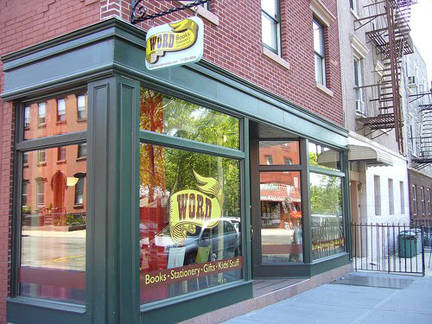 Cool idea of the day: the amazing booksellers at WORD, Brooklyn, N.Y. (likely with more creativity and energy per capita than any other bookstore) are hosting the first of a new monthly series, Literary Karaoke, on Friday, July 15. This first iteration has the theme "greatest hits of the '90s." Participants are given three minutes to read a favorite passage from a book published between 1990 and 1999 that will "surprise and delight the crowd." As the store wrote: "It's better than waiting for a back room at Sing-Sing to belt Pat Benatar."
Cool idea of the day: the amazing booksellers at WORD, Brooklyn, N.Y. (likely with more creativity and energy per capita than any other bookstore) are hosting the first of a new monthly series, Literary Karaoke, on Friday, July 15. This first iteration has the theme "greatest hits of the '90s." Participants are given three minutes to read a favorite passage from a book published between 1990 and 1999 that will "surprise and delight the crowd." As the store wrote: "It's better than waiting for a back room at Sing-Sing to belt Pat Benatar."
---
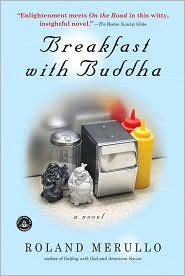 Craig Popelars, director of marketing at Algonquin Books, shared a milestone moment for the publisher and an indie bookseller in Vermont: "This might go down as the greatest handselling feat in the history of Algonquin. Northshire Bookstore, thanks to bookseller extraordinaire Karen Frank, has now handsold 1,000 copies of Breakfast with Buddha by Roland Merullo."
Craig Popelars, director of marketing at Algonquin Books, shared a milestone moment for the publisher and an indie bookseller in Vermont: "This might go down as the greatest handselling feat in the history of Algonquin. Northshire Bookstore, thanks to bookseller extraordinaire Karen Frank, has now handsold 1,000 copies of Breakfast with Buddha by Roland Merullo."
---
German bookseller Thalia is "adding a chain of travel bookshops to its existing portfolio of close to 300 specialist bookshops and the online shop Thalia.de," the Bookseller reported. Thalia is exploring possible locations in airports, stations and other "highly frequented traffic hubs" in Germany, Switzerland and Austria for the shops, which will be up to 1,200 square feet and carry 2,200, primarily paperback titles.
---
 "He has never been known to use a word that might send a reader to the dictionary," William Faulkner once said of Ernest Hemingway. Flavorwire featured the 30 harshest author-on-author insults in history, including Mr. Hemingway's retort: "Poor Faulkner. Does he really think big emotions come from big words?"
"He has never been known to use a word that might send a reader to the dictionary," William Faulkner once said of Ernest Hemingway. Flavorwire featured the 30 harshest author-on-author insults in history, including Mr. Hemingway's retort: "Poor Faulkner. Does he really think big emotions come from big words?"
---
"Who gets hurt when a purported work of nonfiction turns out to be fake or to contain fictional elements?" asked Ian Crouch on the New Yorker's Book Bench blog in his examination of another class-action lawsuit brought against Three Cups of Tea author Greg Mortenson.
Crouch suggested that a better question might be: Who benefits? "A look at the case reminds us of the other group of people who gain from fictionalized memoirs: lawyers who bring the cases. The history of literary jurisprudence is endlessly engrossing; see the United States v. One Book Called Ulysses, the Lady Chatterley's Lover case in Britain, and the Ginsberg Howl obscenity trial, to name just a few modern examples. Judges and juries ruling on the various qualities of books may strike us as odd, and perhaps even dangerous--especially weighing the various merits of fact and fiction--but literature and the law are natural companions, in that they both center on the meaning of words and interpretation of text."
---
Test your Wimbledon lit IQ. To celebrate the beginning of two weeks on the grass courts and to "pass the time while rain stops play," the Guardian featured a tennis in literature quiz.
---
"Haec est Olivia. Perita est multarum rerum." That's the opening sentence to the Latin edition of Ian Falconer’s Olivia, one of "10 modern classics that might make Latin class more fun," Mental Floss suggested.
---
Decorate your home with Fake Books. Flavorwire featured the work of Italian artist Emanuela Ligabue, who "paints plain wooden blocks with simple, elegant designs to turn them into books of her own imagining, which we think would look beautiful on a coffee table, in a kitchen, or hey--even cozied up next to those relics you call real books."
 "A long time ago, Brian and I went to the Allen & Company retreat and I remember listening to a panel of industry leaders of the moment, angst-ing over technology. It was TIVO or VHS, maybe. They were struggling over delivery systems, budget allotments and expectations. We both looked at each other, realizing the same thing at the same moment. Isn't it great that all we do is tell stories? We just create content. We have to be aware of the other stuff, mainly to be opportunistic. Even though the economics of the business are challenging right now, the way that stories get delivered and the types of stories that get told is broadening. So Brian and I feel this is a most exciting time."
"A long time ago, Brian and I went to the Allen & Company retreat and I remember listening to a panel of industry leaders of the moment, angst-ing over technology. It was TIVO or VHS, maybe. They were struggling over delivery systems, budget allotments and expectations. We both looked at each other, realizing the same thing at the same moment. Isn't it great that all we do is tell stories? We just create content. We have to be aware of the other stuff, mainly to be opportunistic. Even though the economics of the business are challenging right now, the way that stories get delivered and the types of stories that get told is broadening. So Brian and I feel this is a most exciting time." 









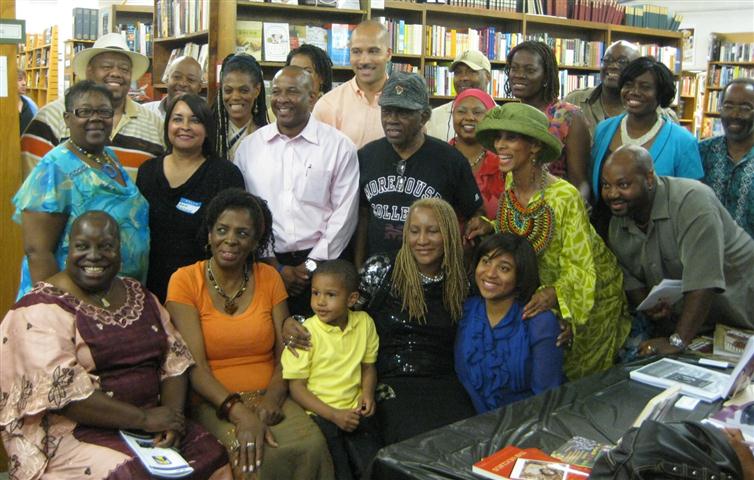

 In a new twist to what has been a standoff regarding $269 million in sales taxes that Texas claims it is owed (
In a new twist to what has been a standoff regarding $269 million in sales taxes that Texas claims it is owed ( Last week, online
Last week, online  The Kindle Million Club has its first self-published member. Using the Kindle Direct Publishing program, John Locke, author most recently (and appropriately) of How I Sold 1 Million eBooks in 5 Months, became the eighth writer to sell more than a million Kindle books. His novels include Vegas Moon, Wish List, A Girl Like You, Follow the Stone and Don't Poke the Bear!
The Kindle Million Club has its first self-published member. Using the Kindle Direct Publishing program, John Locke, author most recently (and appropriately) of How I Sold 1 Million eBooks in 5 Months, became the eighth writer to sell more than a million Kindle books. His novels include Vegas Moon, Wish List, A Girl Like You, Follow the Stone and Don't Poke the Bear! The sale of Whitcoulls and Borders stores in New Zealand by bankrupt REDgroup Retail to the James Pascoe Group (
The sale of Whitcoulls and Borders stores in New Zealand by bankrupt REDgroup Retail to the James Pascoe Group ( Gores's plan would save approximately 250 retail locations, "which he intends to revamp into more appealing destinations akin to Apple Inc.'s outlets," the Journal wrote. Gores Group "would also emphasize developing a more robust online business for Borders."
Gores's plan would save approximately 250 retail locations, "which he intends to revamp into more appealing destinations akin to Apple Inc.'s outlets," the Journal wrote. Gores Group "would also emphasize developing a more robust online business for Borders." While Najafi "has a patient attitude toward the company's digital businesses," he "could bolster his book clubs [Book-of-the-Month Club, the Doubleday Book Club] by tapping the more than 43 million Borders customers who are members of the chain's rewards programs and put outposts in the chain's stores," the Journal noted, adding that he "believes Borders has a strong brand that retains an attractive base of customers Borders can build on by providing them with additional goods and services."
While Najafi "has a patient attitude toward the company's digital businesses," he "could bolster his book clubs [Book-of-the-Month Club, the Doubleday Book Club] by tapping the more than 43 million Borders customers who are members of the chain's rewards programs and put outposts in the chain's stores," the Journal noted, adding that he "believes Borders has a strong brand that retains an attractive base of customers Borders can build on by providing them with additional goods and services."  The British Library reached a deal with Google regarding 250,000 texts dating back to the 18th century, which "will allow readers to view, search and copy the out-of-copyright works at no charge on both the library and Google books websites,"
The British Library reached a deal with Google regarding 250,000 texts dating back to the 18th century, which "will allow readers to view, search and copy the out-of-copyright works at no charge on both the library and Google books websites,"  Cool idea of the day: the amazing booksellers at
Cool idea of the day: the amazing booksellers at  Craig Popelars, director of marketing at Algonquin Books, shared a milestone moment for the publisher and an indie bookseller in Vermont: "This might go down as the greatest handselling feat in the history of Algonquin.
Craig Popelars, director of marketing at Algonquin Books, shared a milestone moment for the publisher and an indie bookseller in Vermont: "This might go down as the greatest handselling feat in the history of Algonquin.  "He has never been known to use a word that might send a reader to the dictionary," William Faulkner once said of Ernest Hemingway. Flavorwire featured the
"He has never been known to use a word that might send a reader to the dictionary," William Faulkner once said of Ernest Hemingway. Flavorwire featured the 
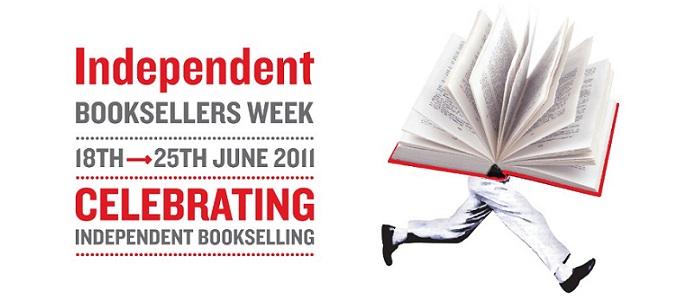

 Evangeline Lilly (Lost) and Barry Humphries have been added to the cast of the film version of J.R.R. Tolkien's The Hobbit. On his
Evangeline Lilly (Lost) and Barry Humphries have been added to the cast of the film version of J.R.R. Tolkien's The Hobbit. On his 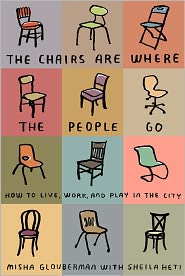 If you're searching for a gift for that student who is ending her academic career or about to take a job in a strange new city, you could do worse than this modest, idiosyncratic version of an urban survival manual. According to his collaborator, Sheila Heti, The Chairs Are Where the People Go is an attempt to capture everything Misha Glouberman, a Canadian "instructor in improvised music and theater," knows. On the evidence of what's contained here, this slim volume only scratches the surface of his fertile mind.
If you're searching for a gift for that student who is ending her academic career or about to take a job in a strange new city, you could do worse than this modest, idiosyncratic version of an urban survival manual. According to his collaborator, Sheila Heti, The Chairs Are Where the People Go is an attempt to capture everything Misha Glouberman, a Canadian "instructor in improvised music and theater," knows. On the evidence of what's contained here, this slim volume only scratches the surface of his fertile mind.